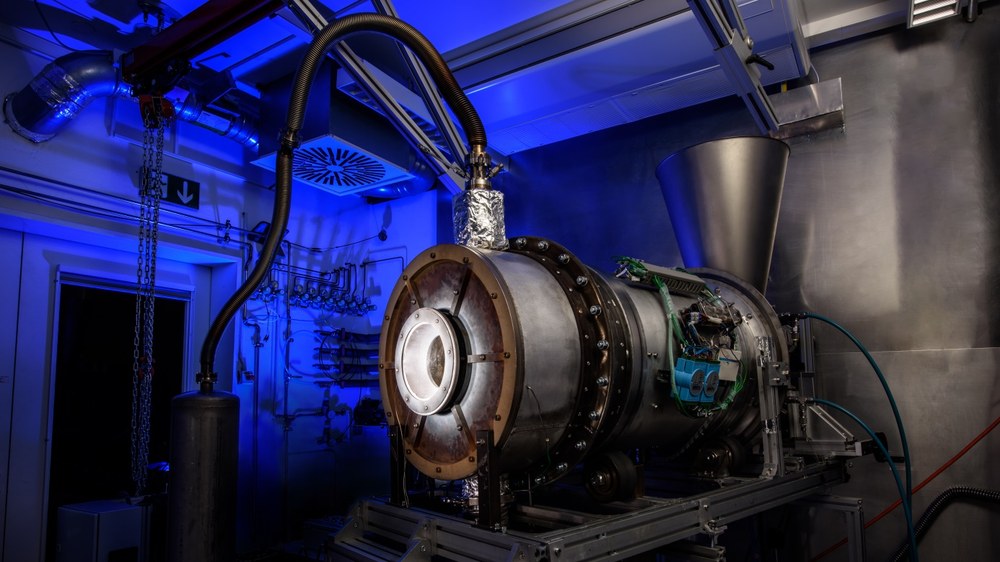New DLR institutes will investigate solar-chemical fuels and the future of air transport


© DLR
- Focus: Energy, air transport, sustainable mobility, alternative fuels and propulsion systems, electric and unmanned flight
In the future, mobility needs to become more environmentally friendly – whether synthetic fuels from renewable sources, electricity or hydrogen, innovative and low-emission engines, unmanned and electric aircraft, or concepts for their integration into the air transport system. The German Aerospace Center (Deutsches Zentrum für Luft- und Raumfahrt; DLR) is establishing four new institutes and facilities to intensify its research on a wide range of topics in these important areas. Financing is now ensured following the passing of the Structural Reinforcement Act (StStG) by the German Federal Parliament and the Federal Council on 3 July 2020. This will create new opportunities in the lignite mining regions affected by Germany’s coal phase out. It will also provide the economy with the opportunity to position itself in the areas of digitalisation and climate-compatible technologies, and strengthen Germany’s position as a prime location for business. The DLR Senate had already given the green light for the establishment of the new institutes and the 'Electric Flight' research programme facilities at its meeting on 23 June 2020.
"We are proud that we were able to persuade with our concepts and expertise, and that we can strongly contribute to structural change, including in the lignite mining areas, with the forward-looking topics of our new institutes and research programmes in North Rhine-Westphalia, Brandenburg and Saxony-Anhalt," says Pascale Ehrenfreund, Chair of the DLR Executive Board. "With the excellent research conducted in these new institutes and facilities DLR will contribute to progress in the fields of electric and unmanned flight, alternative solar fuels and the decarbonisation of mobility. In this way, we are also making an essential contribution to the energy transition."
DLR Institute of Future Fuels (Jülich)
With the establishment of the new Institute of Future Fuels in Jülich, North Rhine-Westphalia, DLR is supplementing and strengthening its research into solar energy production, hydrogen storage and other resources for the production of renewable fuels. Scientists working at the Institute will benefit from DLR’s broad experience in solar thermochemistry – the production of fuels using concentrated solar energy – and will continue to build on this expertise.
The DLR Institute of Future Fuels is pursuing the vision of developing technological solutions to enable the production of solar fuels in Earth’s Sun Belt. The required technologies must be efficient and, above all, highly scalable, as a global economy based on renewable energies will require extremely large quantities of low carbon dioxide fuels. What processes will make it possible to produce feedstocks at low cost and on a large scale? Which liquid fuels can best be produced using solar-generated hydrogen or carbon monoxide? And how can the production processes be optimised? There is a considerable need for research in these areas.
The aim is to at least double the efficiency levels that can be achieved today. This requires not only work on new technologies but also intelligent, digital networking of resources, production and consumers. ‘Digital twins’ will be used for efficient system monitoring. In addition, the DLR Institute of Future Fuels will support industry during implementation of the technologies and will also evaluate the socio-economic aspects and logistics concepts.
DLR Institute of Low-Emission Aero Engines (Cottbus)
The DLR Institute of Low-Emission Aero Engines will focus on research into new propulsion technologies to further improve the environmental compatibility of commercial aircraft. In this way, DLR intends to increase its contribution to quieter and more climate-friendly air transport. The researchers will primarily focus on issues that have not yet been prioritised within DLR’s work. This is intended to close any gaps in the portfolio of aircraft engine research in Germany.
Hybrid power trains, that is, gas turbines combined with an electric propulsion system, are among the technologies that can reduce emissions significantly while retaining excellent performance. The Institute will work on individual components and various pioneering concepts for alternative aircraft engines – including those powered by alternative fuels – hybrid concepts and even fully electric systems. Due to their significantly increased system complexity, such configurations place high demands on intelligent control systems. This will have to be taken into account during development. New regulations and safety concepts regarding aviation requirements will also be necessary. The new DLR Institute for Low-Emission Aero Engines will help to shape and support these with its research.
DLR Electric Flight Research Programme (Aachen, Merzbrück, Cochstedt)
With this research programme, DLR will intensify its work in the areas of unmanned and electric flight. At its locations in North Rhine-Westphalia and Saxony-Anhalt, DLR will address the issues of General Aviation (GA), Urban Air Mobility (UAM), and Unmanned Aerial Systems (UAS) within the Electric Flight Research Programme. For this purpose, two new DLR research facilities will be established:
The Small Aircraft Technologies facility in Aachen and Merzbrück will focus on issues regarding general aviation and urban air mobility, both of which should evolve into concepts for entirely new forms of mobility. Working with a transdisciplinary approach, the DLR researchers will explore overall design, production, sustainable propulsion systems, flight physics and the ever-increasing automation – including autonomy – of new systems.
The Unmanned Aircraft Systems Competence Center will be located in Cochstedt and pursue research in UAS and their safe integration into airspace. In particular, overarching issues such as safety, acceptance and scalability will be examined by interdisciplinary teams. The competence centre will collaborate with another relatively young DLR facility in Cochstedt – the National Experimental Test Center for Unmanned Aircraft Systems – to advance DLR’s research into promising UAS technologies.

